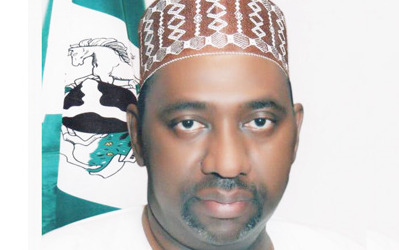The Minister of State for Finance, Bashir Yuguda, on Tuesday in Abuja said states had been discouraged from borrowing due to their existing high debt profiles.
Yuguda said this while giving a lecture on: “Nigeria’s Economic Policies and Reforms.”
The lecture was delivered at the National Defence College.
He said the discouragement from borrowing was because many state governments were heavily burdened with debt, with limited revenue to service them and carry out other assignments.
The minister said debt servicing was currently on the rise as a back drop of high domestic borrowing to finance government expenditure.
According to him, by 2010, government borrowing has risen to N1.36 trillion from around N530 billion in 2009.
He said: “The domestic debt profile of some states is scary. They are so much in debt that only a small amount of their allocation gets to them at the end of the day.
“This is because most times, debt servicing is removed from source.
“This is the reason why we discourage them from borrowing. Even if they will, it has to be on prioritised projects with high returns. Prioritisation is paramount in these difficult times.”
Yuguda said the Federal Government was currently focusing on certain sectors with the potential of improving the nation’s capital base while simultaneously creating jobs.
In the agricultural sector, the minister said the government sought to reposition the sector through the Growth Enhancement Support and the Agricultural Lending Scheme, amongst others.
He said in the manufacturing sector, the government was putting in place policies that would drive investors to make meaningful investment.
He said that the Nigerian Industrial Revolution Plan, which was inaugurated in 2014, would accelerate the buildup of automobile and food processing industries.
On the informal sector, which accounted for a large number of employments in the country, Yuguda said N220 billion had been released for loans to Micro, Small and Medium Enterprises.
He expressed confidence that Nigeria had the requirements to be economically independent.
He said that research had shown that most businesses where self-funded.
He said: “Nigeria is not a donor dependent country.
“Most businesses do not receive support from international agencies.
“Nigeria is one of the few developing countries that does not rely on donor agencies to fund its budget.
“We are self-sufficient.”
Yuguda said the Federal Government was working on tightening ways through which public funds were being mismanaged.
He said: “Through IPPIS, we have saved N161.9 billion as at March 2014 and eliminated 56,000 ghost workers.
“The introduction of GIFMIS in 2012 has improved the acquisition, allocation and utilisation of government’s resources to efficiently track government expenditure and minimised waste.”
Yuguda, who commended efforts by the military to restore peace in some parts of the North, said the military was key in accomplishing the nation’s economic policies and agenda by maintaining peace and unity in the country.
Eralier, the Commandant of the NDC, Rear Admiral Ndidi Agholor, urged participants to develop strategies that would support the development polices of government.
Trending
- Tinubu sends best wishes to Team Nigeria at Paris Olympics
- Police arrest man for allegedly killing friend for ritual in Osun
- 2026: No vacancy in Ekiti Government House – Senate Leader
- Submit your names, addresses to police, IG tells hunger protest organisers
- Discontinue probe in cases pending in court, lawyer writes lawmakers
- ‘Asiyanbi’ stage play: A Journey through Nigeria’s cultural heritage
- Green Economy to drive Nigeria’s economic diversification, job creation – SEC DG
- Atiku mourns Ohaneze Ndigbo President, Iwuanyanwu

